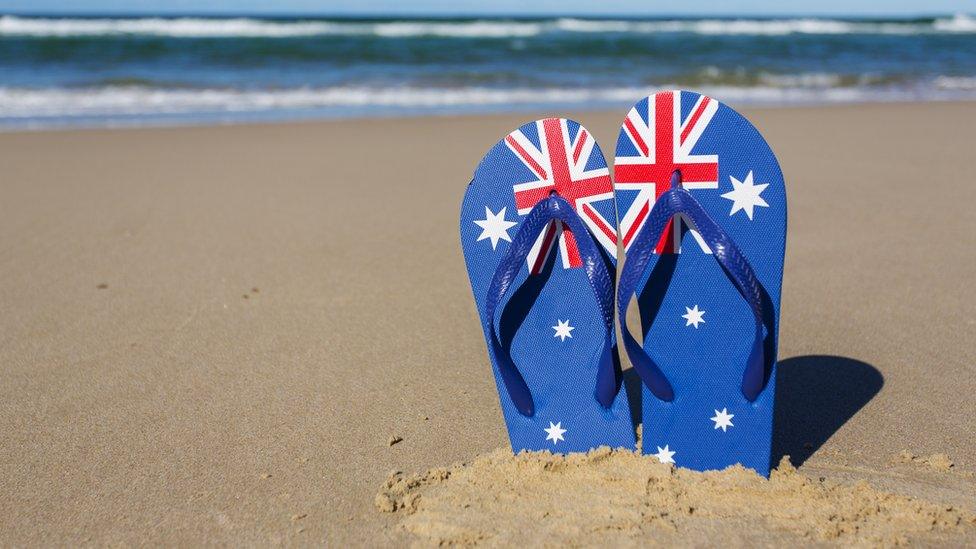Australia Day: The 'quiet rebranding' of a controversial national holiday
- Published
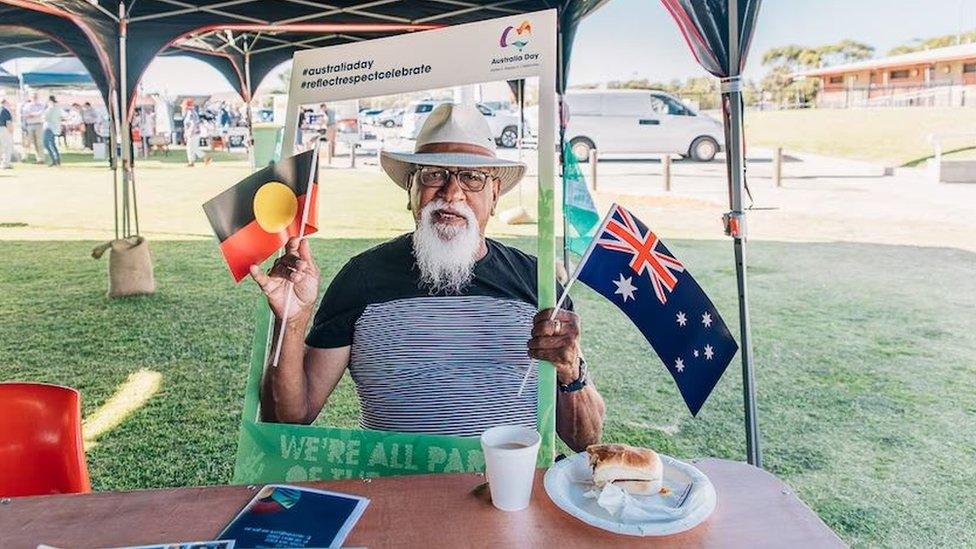
In the town of York, Dennis Kickett is combining Australia Day celebrations with Indigenous storytelling
On 26 January every year - which marks the 1788 landing of Britain's First Fleet in Sydney Cove - two competing stories about Australia are told.
One is of nation-building and achievement; the other is of the displacement and dispossession of Aboriginal and Torres Strait Islander people.
While many Indigenous Australians protest or sit the day out, this year Dennis Kickett is co-hosting a celebration like few others.
"I imagine I'll cop some flak," says the Noongar elder. "But I don't see the date as a barrier."
For the first time, his community of York near Perth will combine three days of Indigenous storytelling with the annual Australia Day festivities. It will include a BBQ with traditional bush tucker and the raising of Australian and Aboriginal flags to welcome new citizens.
Mr Kickett's aim is to use the gathering to explain what happened on 26 January.
"For us to move forward we all have to acknowledge the past. We live in the same community, and we're all striving for the same things," says the 70-year-old, who made the decision with fellow Ballardong traditional owners.
"There's no point segregating ourselves. On that date we will have an audience, so why not educate them?"
The Ballardong First Festival is one of hundreds of gatherings this weekend funded by the National Australia Day Council (NADC) - the body tasked with organising celebrations.
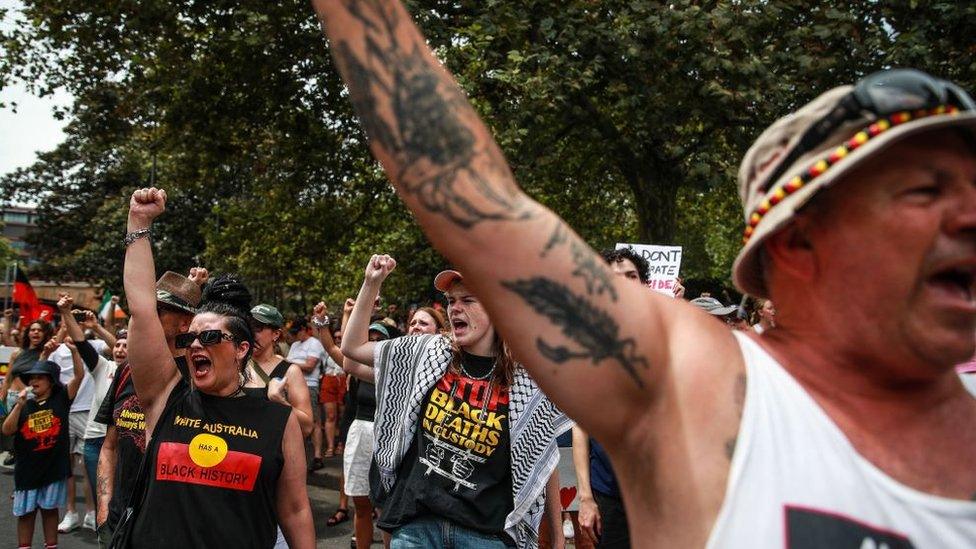
Experts say "Invasion Day" rallies are growing in size and numbers
In recent years it has shifted away from patriotic pageantry towards events which "acknowledge past wrongs" and the "survival, resilience and enduring culture" of Indigenous communities.
But as more people and businesses quietly opt out, and annual "Invasion Day" protests gather steam, some experts say it's unclear if revamping Australia Day will help future-proof it.
A shift among brands and councils
The controversy stems from a debate over the appropriateness of celebrating Australia on a day when Aboriginal and Torres Strait Islander people began being stripped of their lands and cut off from their culture.
Polls show about 60% of Australians see no issue with keeping the holiday as is.
But in recent years, they have suggested small shifts in public sentiment in favour of finding an alternative date - particularly among young people.
And the list of celebrities, sporting stars, and big-name brands distancing themselves from the holiday grows.
Earlier this month the nation's largest retailer, Woolworths, announced it was axing its Australia Day merchandise - such as caps, tattoos, and plastic flags - due to a "gradual decline in demand".
Australian men's cricket captain Pat Cummins also recently threw his weight behind finding "a more appropriate day to celebrate", as did his deputy Steve Smith.
Other critics of the day take even more staunch views.
But many Australians also proudly celebrate it, decking themselves out in flags and other regalia to attend sporting events, BBQs, concerts and firework displays across the country.
Demand from councils and community groups seeking funding to host festivities is "as high as it's ever been", according to the NADC.
And it says a years-long campaign aimed at increasing Aboriginal and Torres Strait Islander participation and "setting a new tone for Australia Day" has been a "great success".
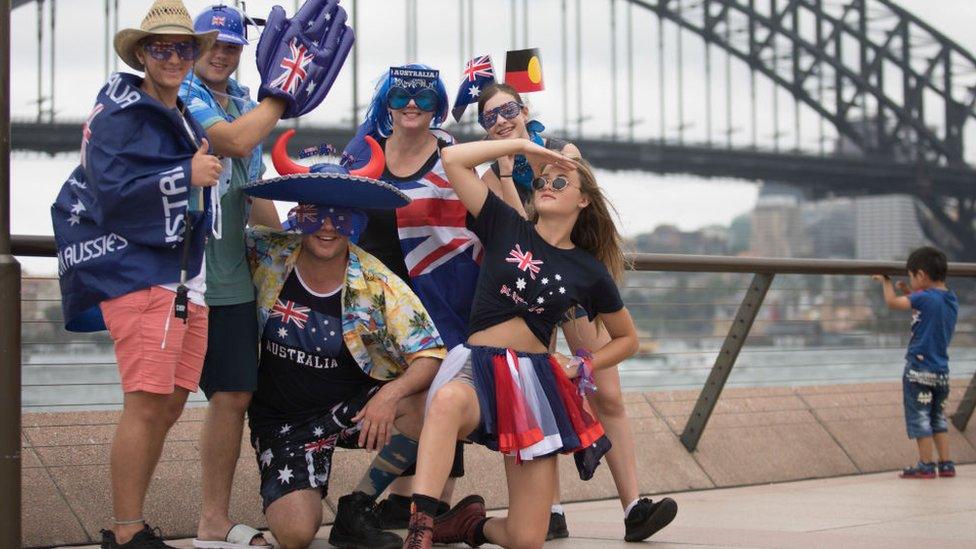
Many Australians proudly celebrate the day each year
Built around the slogan "reflect, respect, celebrate", its advertisements highlighting the "raw" and "painful" parts of Australian history are a dramatic departure from the days when the holiday was marketed as a chance to give thanks for "beaches, lamington drives, and Kylie [Minogue]".
"A quiet rebranding is probably a useful way to think about it," explains Rachel Busbridge, a sociology lecturer at the Australian Catholic University.
"They're trying to create a day that is of resonance and relevance to people. That's the aim, and it says a lot about the shift in Australian society."
Dr Busbridge - who has long studied the public discourse around 26 January - says it will "always be a significant day in the national psyche".
But she's not convinced that the current efforts to preserve it will stand the test of time.
"'Invasion Day' marches are only growing with each year. We're talking up to 50,000 people at some events. And there's more and more popping up, as well as a steady growth in 'Survival Day' festivals."
"Another clear trend is that young Australians increasingly see this as a problematic day, so that might mean it's necessary to find a different date."
For its part though, the NADC says it has seen no signs of declining public participation in its celebrations.
Calls for 'truth-telling'
Roughly 110km (68 miles) west of York, a council in Fremantle is taking an entirely different approach to the holiday.
In 2017, its decision to move its Australia Day events to a "more inclusive" date became a political flashpoint - prompting a stern rebuke from the previous federal government, as well as threats from far-right groups.
Ultimately it stuck though, and Fremantle later won a national award for promoting Indigenous reconciliation.
Now, following much public confusion around last year's referendum on Aboriginal and Torres Strait Islander constitutional recognition, which was decisively rejected, the council is swapping its January festivities for a year-long "truth-telling" exercise.
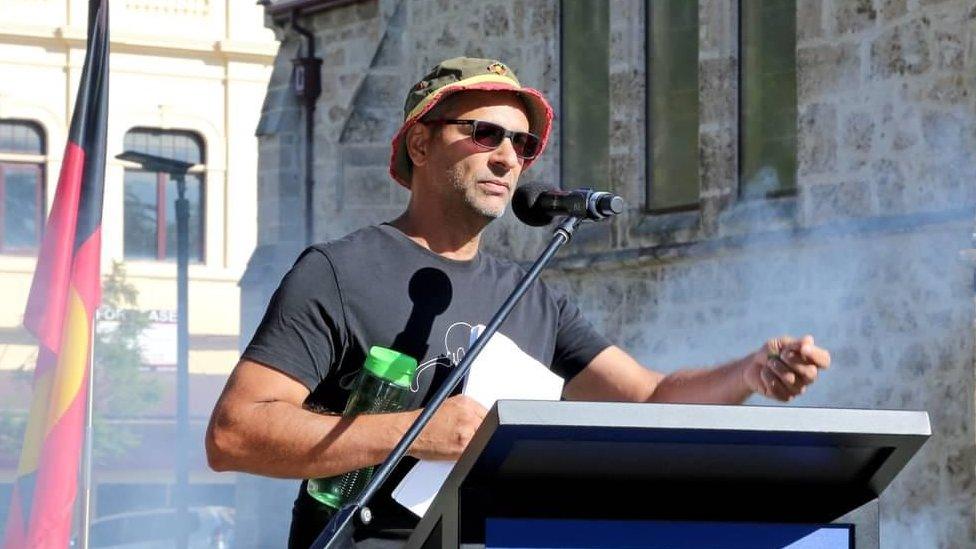
Whadjuk, Yued and Wardandi Noongar man Brendan Moore will help design Fremantle's truth telling programme
"26 January represents the day the myth of Terra Nullius was cultivated in this country," says City of Fremantle Aboriginal engagement officer Brendan Moore. He is referring to the legal concept the British used to settle Australia - which declared it a land belonging to no-one.
"A lot of people still probably wouldn't understand what that means. But it was the beginning of the end for a lot of Aboriginal ways of life," he adds.
"That's why we need truth-telling in this country, about how Aboriginal people weren't just wandering around aimlessly before the Europeans arrived."
Mr Moore, who is helping to design the community-led programme, says it's not about "pointing the finger", but rather, having Indigenous and non-Indigenous Australians embrace their shared past as they look to the future.
It's the same outcome Mr Kickett is hoping for over in York, despite taking a different path to get there.
"This is the first time we've been able to all agree to have our events on the same day. We've got non-Aboriginal people volunteering to man the BBQ - we're all pulling together, so that's positive," he says playfully.
"We're not blaming people today for what happened in the past, it's about making people proud of Indigenous cultures... because we're all citizens of Australia."
Related topics
- Published25 January 2024
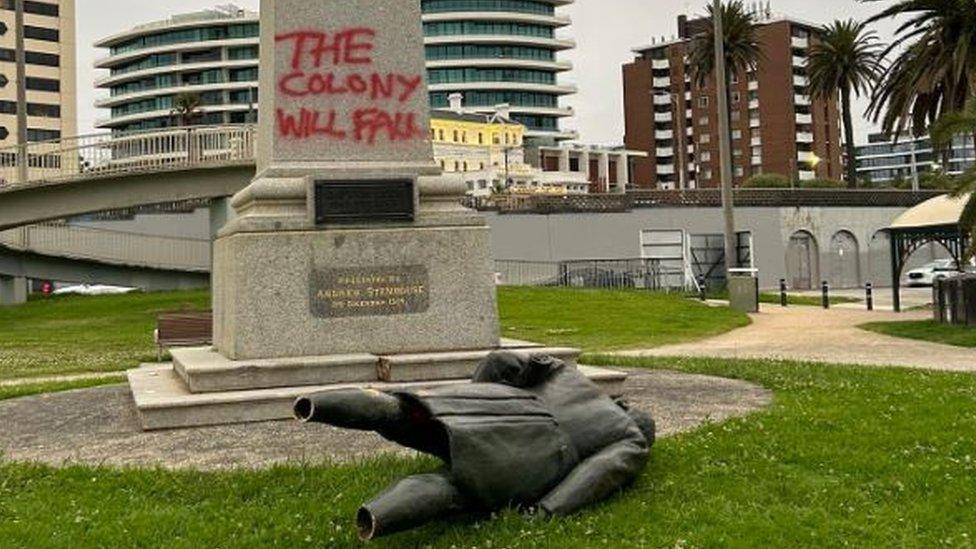
- Published25 January 2023
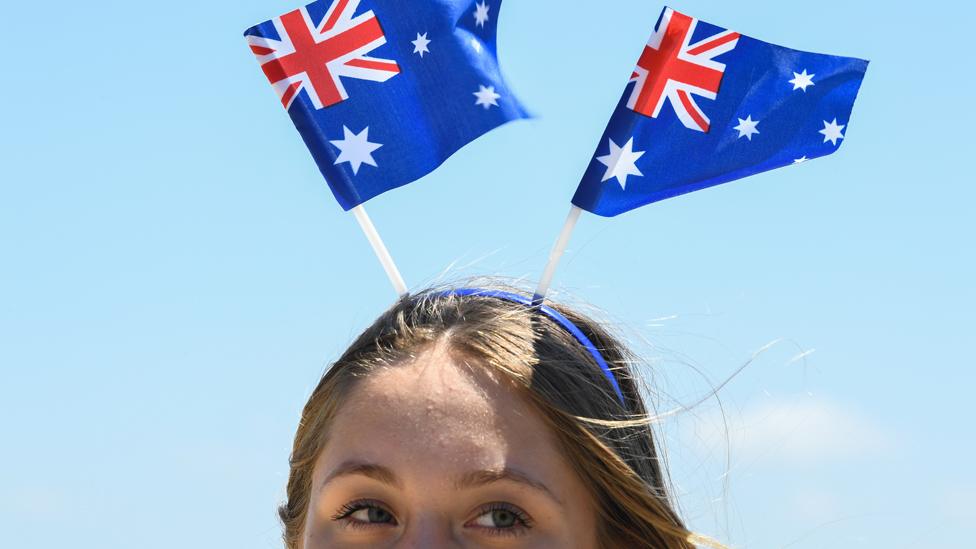
- Published26 January 2021
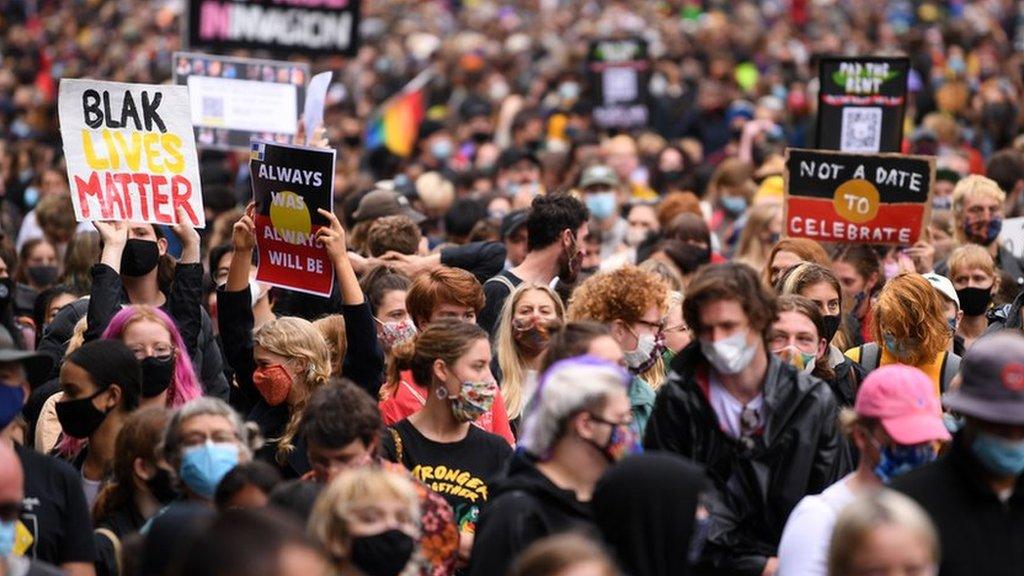
- Published27 January 2023
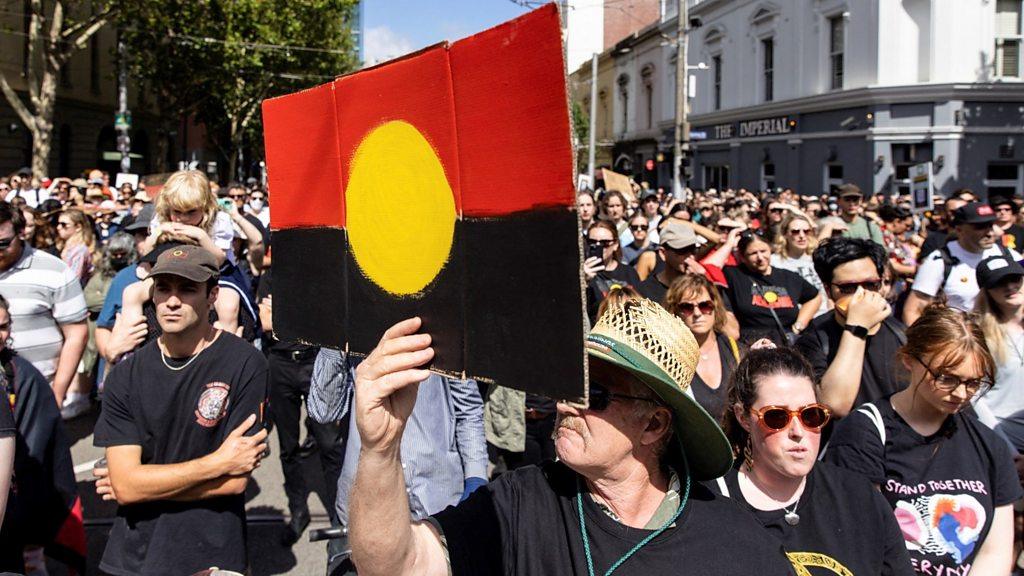
- Published25 January 2018
